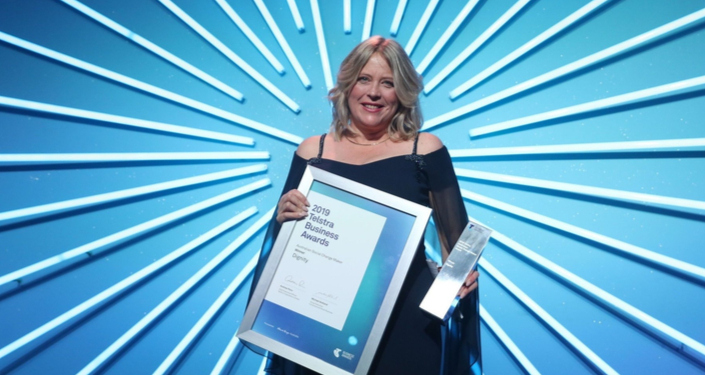By Nicola Field
Suzanne Hopman FIML is a firm believer that managers and leaders can bring about positive social change. In fact, she sees evidence of it every day, in her role as CEO and co-founder of Dignity, a charity that provides essential services to those who are homeless or at risk of becoming homeless.
“Managers and leaders have the ability to impact not only the team that they lead and their customers, but society in general,” says Hopman. “To have the ability to make a social change – and not use it wisely – is a wasted opportunity to make a difference in the way we all live.”
For some leaders, the question is: How can I influence change? Hopman believes it’s an area where any organisation’s corporate social responsibility (CSR) program offers tremendous potential. And she says that can involve a lot more than simply providing handouts to the less fortunate.
CSR: integral to leadership
“Too often CSR plans are viewed as a box that needs to be ticked rather than an opportunity to truly affect social change,” notes Hopman. “A good CSR plan creates corporate culture, and needs to be an integral part of leadership, not just an add-on.”
Effective CSR programs call for an investment of time and resources. But there is growing awareness that CSR initiatives are good business practice.
Hopman explains, “Companies that have deeply considered and well-developed CSR programs have reported better employee engagement and performance, increased creativity, stronger team culture, and are more attractive to prospective employees.”

Hopman explains, “Companies that have deeply considered and well-developed CSR programs have reported better employee engagement and performance, increased creativity, stronger team culture, and are more attractive to prospective employees.”
A wealth of research supports the value of ‘doing well by doing good’. A Nielsen Global Survey found 67% of people prefer to work for a socially responsible company. A PwC report found 59% of millennials are attracted to employers whose CSR values match their own.
CSR can also strengthen an organisation’s market appeal. Hopman points out, “Many customers are demanding to understand the way businesses are contributing to society, and using their buying power to do good. People increasingly weigh up decisions between suppliers, and choose the one that contributes positively to society.”
Find your team’s shared passion
While an organisation’s CSR program may offer leaders and managers scope to create a better world, a key stumbling block can be determining which causes to support.
As Hopman observes, “There are so many different charities doing good things. That’s why business leaders should ask their teams about what they’d like to see changed in the world. There may be a particular passion within the team, so it’s worth engaging your team in the selection and development process.”
While team consensus can encourage buy-in, it also makes sense to look at how you and your team can put real weight behind the charity.
Hopman observes, “People want to be more involved. I’ve seen a shift in approaches – a move away from the older models of just tipping money in a bucket to support a charity. These days, CSR programs can help corporate teams develop a deeper understanding of themselves through engaging with charities who share similar values and beliefs.”
In deciding which causes to support, Hopman recommends “shortlisting a few charities that are aligned with your values and goals rather than taking a scattergun approach. Before making a decision, ask the charities about the direct social impact that your contribution will make. Share ideas, have conversations around how you can understand each other, and discover new ways of working together.”
Form true partnerships with charities
As a guide to how CSR programs can build mutually beneficial relationships, Hopman cites the example of Fantastic Furniture, a corporate partner of Dignity.
“Fantastic Furniture believes all people living in Australia deserve a home which is safe, happy and sustainable,” says Hopman. “So Dignity is well positioned to help Team Fantastic take real action and bring these beliefs to life. Their employees get directly involved, from product teams, who design the furniture layout destined for new Dignity properties, through to lending a hand putting flat-pack furniture together in properties as an integral part of Dignity’s set-up process in the days before opening.

“That’s made a real difference to Fantastic Furniture’s team,” says Hopman. “It gives them an understanding of how they are helping to create a home. Conversely, Dignity makes presentations at Fantastic conferences, and they provide advice to our board. It’s a growing partnership based on shared values and beliefs.”
Don’t expect a one-way street
Hopman is adamant that corporate support of charities should not be a one-way street: “Charities have a responsibility to understand that CSR programs are a partnership, and that brings an element of accountability.
“Corporate partners are entitled to know where their support is going, and what it means,” says Hopman. “Charities need to measure their social impact – what is it they are achieving, what is the real difference they are making.”
In a crowded charity sector, the charities making the biggest impact bring as much passion to business administration and governance as they do the cause itself, says Hopman.
“We knew that to be effective as a charity, Dignity also had to be an incredible business. Our team is very passionate, and developing our culture has been important.
But we think differently – we also follow good business principles. It helps, for example, that I am an ex-hotelier now running an accommodation business, and our CFO Deanna Shim had an international career with PwC. We think commercially and compassionately in equal measure, knowing that if a room goes empty for just one night it is both a waste of our precious resources and a wasted opportunity to empower a person experiencing homelessness.”
A sustainable business model has allowed Dignity to experience tremendous growth. As Hopman points out, “Five years ago we were supporting up to 12 people each night. Now we support 260 people every night. To date we have helped 50,000 Australians find a home.”
Hopman admits she “put it all on the line” when she launched Dignity in 2015, and while she says there have been challenges along the way, she has been pleasantly surprised at the volume of organisations wanting to get involved in creating social change: “We all know we’re making a difference, and that’s incredibly rewarding,” she says.



